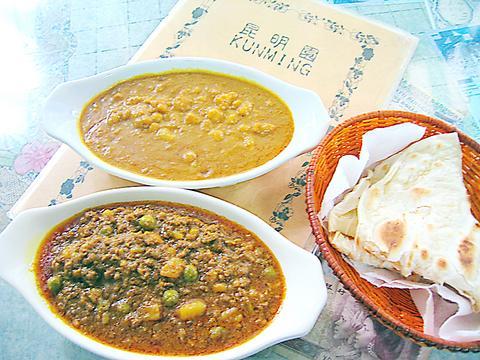Serving up a good selection of moderately priced Indian and South East Asian fare since opening in 1998, the Kunming has built up a reputation amongst it's regulars -- of which there are many -- as one of the capital's leading purveyors of consistently good, spicy food.
While many Taipei restaurants have good days and bad days, it's always a good day at the Kunming. Proprietor, Yacoob Mah (馬雲昌) ensures this by being on hand to make certain that the dishes prepared in his kitchen are cooked the way they should be and that patrons get exactly what they ask for when they ask for it. On any given day, be it lunch or dinner, Mah takes on the roles of both head chef and cordial host.

PHOTO: TAIPEI TIMES
Although I wouldn't normally recommend ruining one's appetite with starters at an Indian restaurant, the Kunming is the exception to this rule. A great way to start a meal is to dive straight in with a plate of samosas (NT$150), which dipped in the accompanying spicy sauce set you in good stead for your main course.
Choosing your main course at the Kunming is half the fun of any visit -- the other half being the eating of it. The menu's mini-international spicy food selection, while not overly grand, does offer patrons the choice of chowing down on a combination of dishes.
Indian dishes such as the fantastic curry daal (NT$180), the tastebud tingling spicy lamb (NT$240), or the creamy chicken masala (NT$220) go quite well, believe it or not, with coconut chicken (NT$220) and/or beef musakka (NT$240). To soak up the mouthwatering grub Mah provides great chapatis (NT$50) and fluffy briyana rice (NT$120).
Whatever you order, a must-try at the Kunming is the joint's Burmese cold-tea salad. At NT$180 a plate it's crisp, fresh, tangy flavor makes the perfect accompaniment to any meal.

Most heroes are remembered for the battles they fought. Taiwan’s Black Bat Squadron is remembered for flying into Chinese airspace 838 times between 1953 and 1967, and for the 148 men whose sacrifice bought the intelligence that kept Taiwan secure. Two-thirds of the squadron died carrying out missions most people wouldn’t learn about for another 40 years. The squadron lost 15 aircraft and 148 crew members over those 14 years, making it the deadliest unit in Taiwan’s military history by casualty rate. They flew at night, often at low altitudes, straight into some of the most heavily defended airspace in Asia.

Beijing’s ironic, abusive tantrums aimed at Japan since Japanese Prime Minister Sanae Takaichi publicly stated that a Taiwan contingency would be an existential crisis for Japan, have revealed for all the world to see that the People’s Republic of China (PRC) lusts after Okinawa. We all owe Takaichi a debt of thanks for getting the PRC to make that public. The PRC and its netizens, taking their cue from the Chinese Communist Party (CCP), are presenting Okinawa by mirroring the claims about Taiwan. Official PRC propaganda organs began to wax lyrical about Okinawa’s “unsettled status” beginning last month. A Global

Taiwan’s democracy is at risk. Be very alarmed. This is not a drill. The current constitutional crisis progressed slowly, then suddenly. Political tensions, partisan hostility and emotions are all running high right when cool heads and calm negotiation are most needed. Oxford defines brinkmanship as: “The art or practice of pursuing a dangerous policy to the limits of safety before stopping, especially in politics.” It says the term comes from a quote from a 1956 Cold War interview with then-American Secretary of State John Foster Dulles, when he said: ‘The ability to get to the verge without getting into the war is

Like much in the world today, theater has experienced major disruptions over the six years since COVID-19. The pandemic, the war in Ukraine and social media have created a new normal of geopolitical and information uncertainty, and the performing arts are not immune to these effects. “Ten years ago people wanted to come to the theater to engage with important issues, but now the Internet allows them to engage with those issues powerfully and immediately,” said Faith Tan, programming director of the Esplanade in Singapore, speaking last week in Japan. “One reaction to unpredictability has been a renewed emphasis on